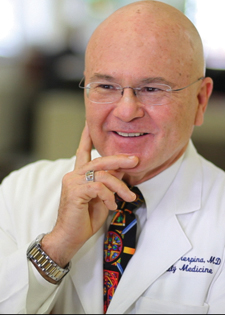 BY Victor S. Sierpina, MD, ABFM, ABIHM, Director, Medical Student Education Program, WD and Laura Nell Nicholson Family Professor of Integrative Medicine, Professor, Family Medicine University of Texas Distinguished Teaching Professor
BY Victor S. Sierpina, MD, ABFM, ABIHM, Director, Medical Student Education Program, WD and Laura Nell Nicholson Family Professor of Integrative Medicine, Professor, Family Medicine University of Texas Distinguished Teaching Professor
Recently, I participated in the Texas Academy of Family Practice annual virtual conference and saw a presentation on COVID and mental health. It was given by Katherine Buck, Ph.D., and Dr. Grant Fowler, from John Peter Smith Hospital. I will share part of their information today.
First, some sobering statistics. Anxiety has tripled since 2019 and depression has quadrupled. Suicide ideation, those who report thinking about harming themselves in the past 30 days, was up to 25 percent, alarmingly highest among younger people in the 18 to 24 age group.
Overall, younger adults, racial/ethnic minorities, essential workers, and unpaid adult caregivers reported worse, mental health outcomes, increased substance abuse, and elevated suicidal ideation. Alcohol sales are up by 54 percent and increased use was reported to be elevated by at least 17 percent in women and men.
Those with preexisting mental health issues suffered worse from lack of access to care, medications, and increased stress and isolation.
Several psychological phenomena and cognitive distortions may develop and accelerate in relation to COVID:
THREAT SCANNING
When your mind searches the environment for what you fear, consciously or subconsciously. Threat scanning is often associated with your mind assigning meant to harmless events.
Frequently checking your body for coronavirus symptoms.
Obsessively checking the news for coronavirus updates.
CATASTROPHIZING
When your mind jumps to worst-case scenarios, i.e., “making a mountain out of a molehill.”
You feel chest tightness and your mind tells you that you have coronavirus and that your life is in danger.
Your mind gives you the mental image of losing all the people you love.
HYPOTHETICAL WORRY
It’s important to note that worry is normal. It only becomes unhelpful when you focus excessively on hypothetical worries instead of practical worries, hypothetical being things you don’t have much control over vs. practical things you do have control over.
“I know I’m following all the guidelines, but what if I spread the virus?”
“What if someone gets too close to me at the supermarket and I catch it?”
EMOTIONAL REASONING
When your mind tells you that your emotions reflect reality. While emotions can act as helpful messengers, they often aren’t reliable.
“I feel scared, so I must be in danger.”
“I feel guilty, so I must’ve done something wrong.”
FORTUNE TELLING
When your mind interprets predictions as facts.
“I’m going to be stuck inside for months on end.”
“My mental health will keep deteriorating, and I’ll have to go back on meds.”
Treatment for these are similar as for anxiety and depression unrelated to COVID and included some of the following:
1. A daily gratitude practice and journal
2. Diaphragmatic breathing
3. Distraction
4. Social support
5. Exercise
6. Planning
7. Having a routine, even when working from home
8. Identify substance abuse issues and seek care
9. A healthier news diet from trustworthy sources
10. Counseling
11. Cognitive behavioral therapy
12. Medications
If you’re not feeling at your best mentally, you have lots of company. Try some of the self-help approaches as listed and seek professional consultation if needed. t
(COVID ANXIETY AND STRESS RESOURCES)
https://thewellnesssociety.org/wp-content/uploads/2020/04/Coronavirus-Anxiety-Workbook.pdf
https://www/apa.org/topics/covid-19
https://www/cdc/gov/coronavirus/2019-ncov/daily-life-coping/managing-stress-anxiety.html


